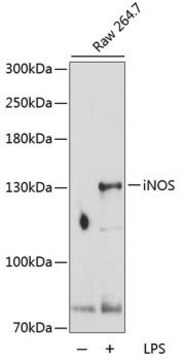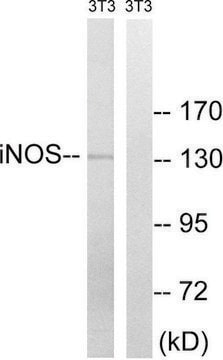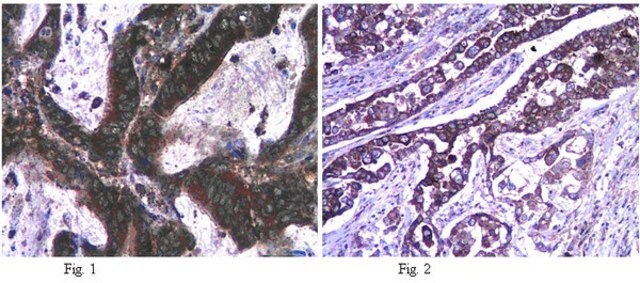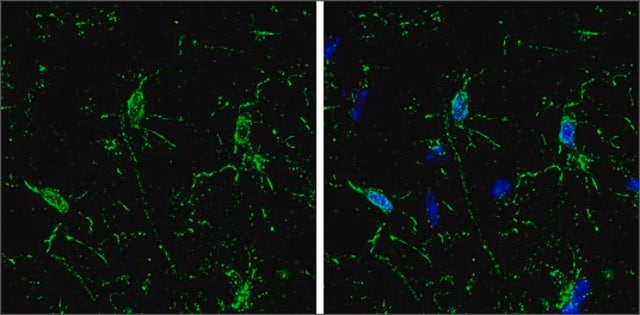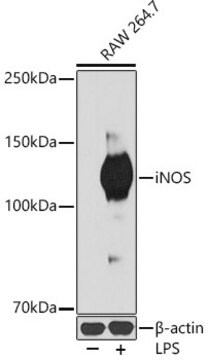SAB5500152
Anti-INOS antibody, Rabbit monoclonal
clone SP126, recombinant, expressed in proprietary host, affinity isolated antibody
Iniciar sesiónpara Ver la Fijación de precios por contrato y de la organización
About This Item
UNSPSC Code:
12352203
NACRES:
NA.41
conjugate:
unconjugated
application:
IHC
clone:
SP126, monoclonal
species reactivity:
human (tested)
citations:
5
technique(s):
immunohistochemistry: 1:100
Productos recomendados
biological source
rabbit
Quality Level
recombinant
expressed in proprietary host
conjugate
unconjugated
antibody form
affinity isolated antibody
antibody product type
primary antibodies
clone
SP126, monoclonal
species reactivity
human (tested)
species reactivity (predicted by homology)
rat
technique(s)
immunohistochemistry: 1:100
isotype
IgG
UniProt accession no.
shipped in
wet ice
storage temp.
2-8°C
target post-translational modification
unmodified
Gene Information
human ... NOS2(4843)
General description
Inducible NOS (iNOS) or macrophage NOS (mNOS) is calcium/calmodulin independent and is expressed in activated macrophages and stimulated glial cells. NOS oxidizes a guanidine nitrogen of arginine, releasing nitric oxide in the form of a free radical and citrulline. Nitric oxide thus generated acts as a messenger in diverse functions including vasodilation, neurotransmission, anti-tumor and anti-pathogenic activities.
Immunogen
Synthetic peptide near the C-terminus of mouse iNOS protein.
Features and Benefits
Evaluate our antibodies with complete peace of mind. If the antibody does not perform in your application, we will issue a full credit or replacement antibody. Learn more.
Physical form
0.1 ml rabbit monoclonal antibody purified by protein A/G in PBS/1% BSA buffer pH 7.6 with less than 0.1% sodium azide.
Disclaimer
Unless otherwise stated in our catalog or other company documentation accompanying the product(s), our products are intended for research use only and are not to be used for any other purpose, which includes but is not limited to, unauthorized commercial uses, in vitro diagnostic uses, ex vivo or in vivo therapeutic uses or any type of consumption or application to humans or animals.
¿No encuentra el producto adecuado?
Pruebe nuestro Herramienta de selección de productos.
Storage Class
10 - Combustible liquids
wgk_germany
WGK 2
flash_point_f
Not applicable
flash_point_c
Not applicable
Elija entre una de las versiones más recientes:
¿Ya tiene este producto?
Encuentre la documentación para los productos que ha comprado recientemente en la Biblioteca de documentos.
Lars Aakerøy et al.
Physiological reports, 10(21), e15505-e15505 (2022-11-04)
Cigarette smoke (CS) is the major risk factor for COPD and is linked to cardiopulmonary dysfunction. Exercise training as part of pulmonary rehabilitation is recommended for all COPD patients. It has several physiological benefits, but the mechanisms involved remain poorly
Olga V Kovaleva et al.
Analytical cellular pathology (Amsterdam), 2020, 5424780-5424780 (2020-09-05)
Tumor-associated macrophages (TAMs) and tumor-infiltrating lymphocytes (TILs) contribute significantly to the development of immunosuppressive properties of a tumor. In this study, we performed immunohistochemical analysis of immune cells of esophageal tumors stroma. Paraffin-embedded tissue specimens from 48 esophageal squamous cell
Olga Kovaleva et al.
Biomedicines, 8(9) (2020-09-17)
The link between a lung tumor and the lung microbiome is a largely unexplored issue. To investigate the relationship between a lung microbiome and the phenotype of an inflammatory stromal infiltrate, we studied a cohort of 89 patients with non-small
Olga V Kovaleva et al.
International journal of molecular sciences, 22(1) (2021-01-21)
There is an urgent need for identification of new prognostic markers and therapeutic targets for non-small cell lung cancer (NSCLC). In this study, we evaluated immune cells markers in 100 NSCLC specimens. Immunohistochemical analysis revealed no prognostic value for the
Olga Kovaleva et al.
Biomedicines, 9(7) (2021-07-03)
Esophageal cancer is one of the most aggressive malignant neoplasms, with low survival rates and limited treatment options. In this study we analyzed the microbiome composition and the phenotype of inflammatory tumor infiltrate in squamous cell carcinoma of esophagus (ESCC)
Nuestro equipo de científicos tiene experiencia en todas las áreas de investigación: Ciencias de la vida, Ciencia de los materiales, Síntesis química, Cromatografía, Analítica y muchas otras.
Póngase en contacto con el Servicio técnico
